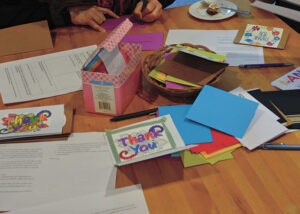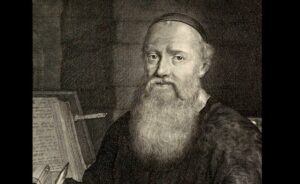Affirming LGBTQ+ inclusion in the church has been discussed for years in many Christian circles, yet congregations and regional churches tend to not move beyond the initial question to discover the rich scope queer theology offers.
First Mennonite Church in Winnipeg is pushing past that boundary with its new series, “Queer theology and the church: After the affirmation.”
“It’s often said, becoming an affirming church isn’t a conclusion, but the beginning of a different way of being church,” said David Driedger, leading minister at First Mennonite. “But I wasn’t really seeing a lot of what that meant concretely in a lot of churches, at least in Mennonite circles.”
The series’ first event on Oct. 30 featured Melanie Kampen, who spoke on “Interrogating Christian theology to be trauma-informed and justice-making in its approach.” Almost 70 screens tuned into the livestream throughout the evening and around 50 people gathered in person for the talk, engaging in a Q&A period and sticking around afterwards to connect with each other.
Kampen is an alum of Westgate Mennonite Collegiate and Canadian Mennonite University, both in Winnipeg. She is currently located at the Centre for Transnational Mennonite Studies at the University of Winnipeg, where she is working on a post-doctoral degree and teaching a course on the history of peace and nonviolence. Her research has primarily focused on Mennonite involvement in colonization in Canada, although she spent last year studying sexual violence in Mennonite communities. Her work in queer theology has stemmed mainly from her personal interest and her experience as a queer person growing up in the Mennonite church.
Kampen doesn’t participate in church discussions around queerness because she refuses to engage in conversations that question the validity of her existence. The church goes in circles, discussing over and over again whether Scripture supports the inclusion of queer people, if it’s moral to support their inclusion, and are queer people living in sin and does the church need to intervene.
“There’s this constant weighing of Scripture against the lives of queer people, more often than not without even involving queer people in the conversation,” Kampen said. “The question of inclusion is very tiresome, especially for queer people. Constantly having to do that kind of labour, being put in the position where you need to defend your very existence . . . is tiring.”
The question of inclusion is not even the most helpful, or interesting, question, she said, noting that, with inclusion, “you’ve just widened your circle to include another group of people. But it doesn’t change anything about the structures that made exclusion of those people possible in the first place.”
The church should not only be including people in the current structures; it should be breaking out of those structures and building new ones, she said.
More than a quarter of the event’s in-person participants were people under the age of 30. At a time when worry circulates about the decreasing involvement of young people in the church, this fact stands out in stark relief.
“There is more that queerness asks from the church than simply inclusion,” Kampen said. “It makes me wonder whose other voices are we missing. People like me who won’t join the normal conversation, who we pushed out too far, that could potentially help churches be better.”
Other speakers included Tim Wenger and Matthew Froese, organizers with In this Together, who led a session about “Worshipping the (w)holy other: Queer theology in our hymns and confessions,” on Nov. 6; and Driedger, who spoke on Nov. 13 on the topic, “Undressed or undone?: How sex and holiness change everything.”
Jude Claude, a theologian and community organizer, will conclude the series this coming Sunday, Nov. 20, with their talk on “Queer theology beyond inclusion: An exploration of the work of Marcella Althaus-Reid.”
Visit firstmennonitechurch.ca/services to watch the events.









Leave a Reply
You must be logged in to post a comment.